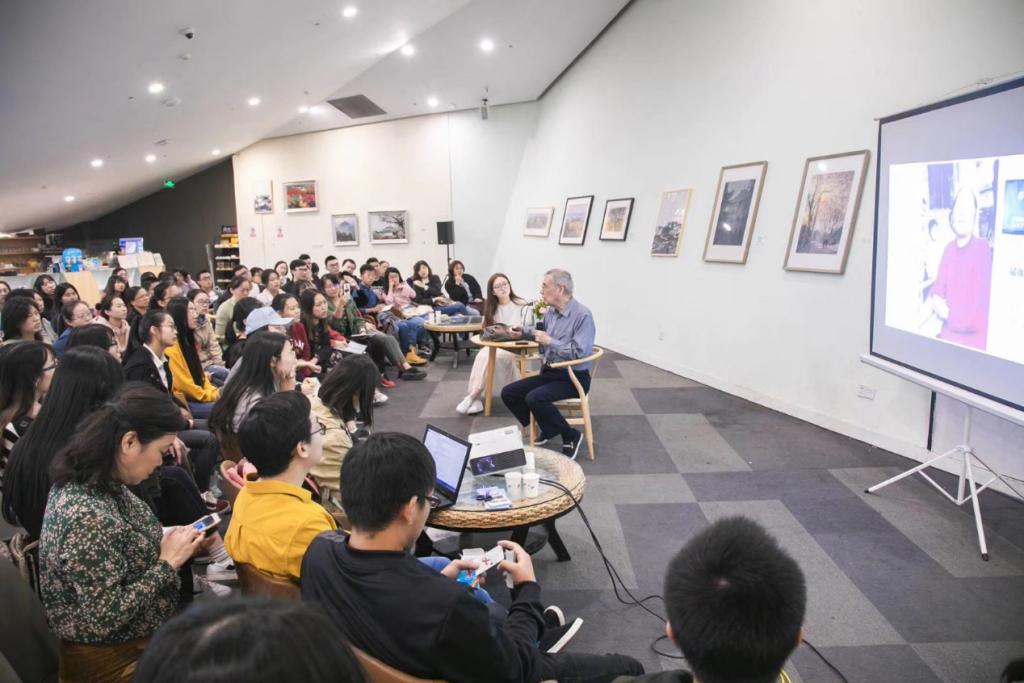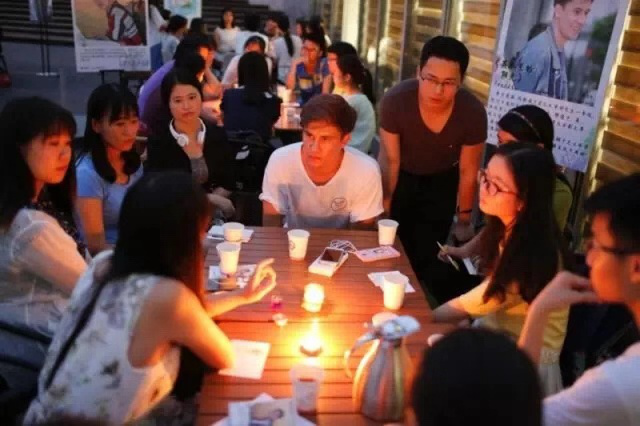On Monday, over 100 people gathered in Wanlin Museum of Wuhan University to attend a lecture given by Mr. Gui Xi’en, a respectable expert in AIDS/HIV research from Zhongnan hospital. The 80-year-old gentleman discussed the value of life, public health and the complicated humanity hidden behind AIDS with all the audience. One of the audience said after the lecture, “I used to think that an ordinary person can contribute very little to the world. However, I understand now there are always some people trying hard to make a difference in spite of their limited capability. Maybe they are not the ‘smartest’, but they are the ‘noblest’ in spirit. Professor Gui Xi’en is just one of them. And I now believe I can also do my part to build a better world.”

Professor Gui at the “living library”
“I want to help my patients to relight hope with courage,” Mr. Gui said. The professor’s lecture made the audience interested to explore disease, pain and life, which is the exact aim of the “living library” activity. Originated from Malmo Library in Sweden, “living library” encourages individuals with different backgrounds and life experiences to share their stories and develop friendships. In Wuhan University, a group of young students from Yuewei Reading Society first sponsored the “living library” in 2014. Up to now, the society has held about 50 “living library” activities for students. It also cooperated with Hubei Provincial Library to make the activity known to more citizens in Wuhan.

Professor Gui is telling his story
Tang Yuehui, a 2018 graduate from the school of literature who now studies in Chinese University of Hong Kong, is one of the sponsors of Yuewei Reading Society. He has witnessed the growing popularity of “living library” in Wuhan University. When asked about the reasons why they set up the society and how they came up with the creative ideas, he says it has something to do with his own personalities, as he likes to chat and share his ideas with others. As a graduate in the humanistic science class, he has an instinctive ability to capture audience concentration with outstanding communication skills and abundant literature and artistic knowledge accumulated by reading. Shen Yan, the advisor teacher, working in the Library of Wuhan University told us that she was glad to meet a group of passionate and creative students there and cooperate with them. She said, “What we want to do is to set up a platform for us teachers, students and even more people outside the campus to slow down their pace and exchange ideas, which may help inspire new ideas or solve some problems in their own life. Sharing is the most precious treasure.”
As Shen mentioned, sharing and listening are the cores of “living library”. The participants are willing to share their own experiences, values and opinions, and they also respect others’ sharing by listening attentively. Thus, it provides a platform for idea exchanges. Jessy, a frequenter of the activity, talked about her views of it. “At the beginning, I regarded ‘living library’ as a lecture, but later I was deeply attracted by it because I could be not only a listener but also a contributor. The thoughts from others inspire me to perceive many things from different perspectives.” Another participant, Li Zeyun added, “I found ‘living library’ help me know experts from various fields. My favorite one was the ‘living library’ on Friday, April 27th, when everyone listened carefully to two gentlemen sharing their opinions about the relation between life and art.” They are Professor Jiang Baian from the School of Art, and Li Gongzhen from the School of History, both well known in Wuhan University for interesting teaching methods and quick-wittedness. Their humorous words did arouse the audience’ s interests to discuss music, history and life. “I like it because communicating with the two professors was like a pleasant journey of music, art and life, and I have found more about the treasure in our life after their words.” Li said.
All participants at the invitation of Yuewei Society can join this activity for free. With members from diversified backgrounds and occupations, “living library” provides topics for discussion that intrigue numerous participants. For example, Zhou Xiaoyu, a dubber of many online games and cartoons, draws the attention of the members with her dubbing experiences. She has made a brief introduction of her work and the dubbing industry, which is a novel topic for students in the campus.

Students are discussing during the “living library”
After four years of development since its start, “living library” has gained much more popularity and support now with its sincerity. In 2017, an activity of “living library” –“Little Paradise” in Wuhan University won the third prize of IFLA Biblibre International Library Marketing Award. After that, many students’ clubs in Wuhan University including Chunyin Poetry Society have started cooperating with Yuwei Society, which encourages the members to keep strengthening their team building.
If you see the lights glittering in Wanlin Museum and some people discussing life, philosophy, health or literature, you may want to join them. “We have been accustomed to understanding history and human minds in a simplified and patterned way although they are much more complicated than we think. Yuewei Society is trying to encourage both the readers and speakers to think deeply about the stories and opinions they share together,” Tang said, “In Chinese, ‘Yue’ means read, and ‘Wei’ means micro. We hope that ‘living library’ can help participants to explore their diversified ideas in a micro level. Because each of us is an individual and each of us is unique
Edited by: Hu Yue, Wang Wei & Hu Sijia
Photo by Tang Yuehui & Long Quan


